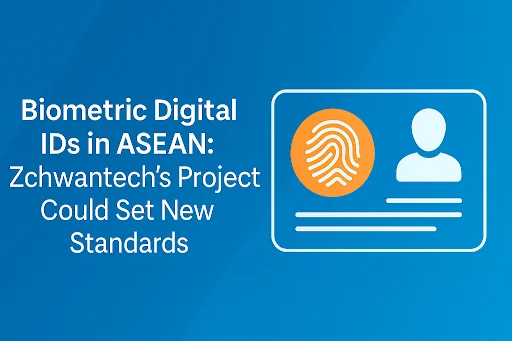Southeast Asia is moving quickly toward digital governance, and biometric digital identity systems are becoming a key part of that shift. One company making significant strides is Zchwantech, a Malaysia-owned technology firm, which recently launched a national digital identity project in Timor-Leste. As countries across the ASEAN region seek modern and secure citizen authentication systems, Zchwantech’s approach centers on biometric verification and blockchain-based infrastructure is drawing attention.
Zchwantech: A Rising Leader in Digital Identity Tech
Background and Company Profile
Zchwantech is a Malaysia-owned technology firm specializing in secure digital infrastructure, identity management, and data security. With years of experience in enterprise-level technology solutions, the company has positioned itself as a key player in public sector innovation. Zchwantech technology focuses on blending robust cybersecurity protocols with practical, user-focused design.
The company has worked with both government and private sectors, creating platforms that handle complex data environments. Its digital identity systems are modular, scalable, and designed to meet both local governance requirements and international best practices.
Regional Vision and Innovation Drive
Zchwantech’s vision extends beyond Malaysia. The company sees Southeast Asia as a region ripe for digital transformation, especially in areas like identity verification, public records, and digital payments. It aims to bridge the gap between underserved populations and digital services by building tools that are accessible, secure, and easy to deploy.
“Every ASEAN country has its own challenges when it comes to digital identity,” said Ms. Nora Liew, Director of Regional Operations at Zchwantech. “But the goal is the same: to ensure that every citizen, regardless of geography or income, can be counted, protected, and served.”
With governments across ASEAN ramping up digital infrastructure initiatives, Zchwantech has tailored its approach to support regional goals. The company focuses on sovereignty, security, and scalability—key concerns for nations building their digital futures.
The Timor-Leste Initiative: A National Milestone
Why Timor-Leste Chose Zchwantech
Timor-Leste, a young nation preparing for ASEAN membership, has made digital transformation a cornerstone of its development plan. The government needed a digital identity solution that was both technically sound and adaptable to local challenges. After evaluating several contenders, it selected Zchwantech for its proven ability to deliver complex systems in emerging environments.
Zchwantech’s emphasis on data sovereignty and citizen privacy aligned closely with Timor-Leste’s priorities. The project also represents a milestone in bilateral cooperation between Malaysia and Timor-Leste, strengthening diplomatic and economic ties through technology.
Key Features of the Project
The platform developed by Zchwantech enables secure, biometric-based identification for every registered citizen. The system incorporates fingerprint scanning, facial recognition, and digital ID issuance, both in physical card form and as mobile credentials. It also uses blockchain technology to ensure data integrity and tamper-proof audit trails.
“This system will give our people the digital identity they deserve,” said Mr. Joaquim da Costa, Digital Transformation Officer for Timor-Leste’s Ministry of State Administration. “We are proud to be taking this step with a trusted regional partner.”
Dato’ Seow Gim Shen, Chairman of Zchwantech, echoed this sentiment by highlighting the initiative’s broader impact: “This is not just about technology—it’s about empowering Timor-Leste’s citizens with the tools to thrive in a digital ASEAN. Our solution will bridge gaps in service delivery, financial inclusion, and governance, ensuring no one is left behind.”
The solution is designed to integrate with key public service platforms, such as healthcare, civil registration, education, and financial services. By allowing seamless verification, it simplifies access to critical services while reducing fraud and administrative overhead.
Technology Behind the Identity System
Biometric and Verification Framework
The core of the platform is a robust biometric identity system. Fingerprint and facial recognition are used to establish unique identities for citizens, eliminating duplicate records and reducing the risk of identity fraud. The data is encrypted and stored in a secure environment, accessible only by authorized agencies.
Verification is instantaneous and can be done through kiosks, mobile apps, or integrated service portals. Liveness detection and anti-spoofing features are built in to prevent manipulation and impersonation.
Blockchain Integration
To further protect citizen data and promote transparency, Zchwantech technology uses blockchain for recordkeeping. Each interaction with the system—be it enrollment, verification, or update—is recorded on a decentralized ledger. This ensures accountability and prevents data tampering.
Blockchain also enables consent-based data sharing. Citizens have control over who accesses their information, adding an extra layer of security and trust.
Mobile and Offline Accessibility
The identity platform is optimized for mobile access, with a lightweight app that allows users to manage their digital identity even in low-connectivity areas. For remote regions, offline functionality ensures that data collection and verification can continue without internet access. Once reconnected, the data is synchronized with central servers.
The user interface supports multiple languages and includes accessibility features for people with limited digital literacy or disabilities, ensuring inclusive adoption across all demographics.
ASEAN-Wide Implications
Driving Interoperability Across Borders
Zchwantech’s system isn’t just a national solution—it’s designed to work across borders. As ASEAN explores unified digital identity frameworks to support regional mobility and trade, a platform like this could offer a replicable model. Its use of open standards and modular architecture makes it adaptable for other member states.
By creating identities that are secure, verifiable, and interoperable, Zchwantech lays the groundwork for cross-border recognition of identity credentials, which could simplify travel, cross-border healthcare, and digital commerce within ASEAN.
“We envision a future where a citizen from Timor-Leste can access services in another ASEAN country with the same digital ID,” said Ms. Liew. “That’s the long-term vision we are working toward.”
Supporting Public Sector Efficiency and Inclusion
Digital identity systems enable more efficient public service delivery by eliminating redundancies and ensuring accurate beneficiary targeting. Governments can cut costs while improving access to services like healthcare, subsidies, and education.
For citizens, especially those previously excluded due to lack of documentation, a biometric identity provides access to formal systems. This is a critical step toward financial inclusion and legal empowerment in rural or underserved areas.
Alignment with Global Standards
The identity platform follows best practices from global frameworks such as the World Bank’s ID4D principles and the EU’s GDPR. By embedding consent-based access, end-to-end encryption, and regular security audits, Zchwantech ensures the platform is compliant with international expectations around data privacy and protection.
Such alignment makes the platform not just functional but also credible on a global scale, encouraging adoption beyond ASEAN.
Malaysia’s Role in Shaping ASEAN Digital Identity Landscape
Zchwantech as a National Tech Success Story
The success of Zchwantech underscores Malaysia’s capabilities in exporting advanced technology. It shows how homegrown innovation can contribute meaningfully to regional challenges, offering alternatives to global tech giants that may not fully understand local contexts.
Zchwantech’s achievement boosts Malaysia’s profile in the tech ecosystem and paves the way for similar companies to expand into regional and international markets.
“This project reflects Malaysia’s growing role in shaping Southeast Asia’s digital transformation,” said Mr. Daniel Wong, Trade Commissioner with Malaysia External Trade Development Corporation (MATRADE). “Zchwantech is setting an example for what Malaysian tech can achieve.”
Economic Diplomacy and Regional Influence
This project also strengthens Malaysia’s diplomatic ties with Timor-Leste. It reflects a broader trend where technology becomes a tool of soft power, enabling countries to extend their influence through knowledge sharing and infrastructure building.
Malaysia’s leadership in digital identity, through companies like Zchwantech, could play a pivotal role as ASEAN shapes its digital future.
Conclusion
Zchwantech’s digital identity project in Timor-Leste is more than a technology deployment—it’s a blueprint for how biometric systems can drive secure, inclusive, and interoperable digital governance in Southeast Asia. The firm’s ability to deliver a scalable, secure, and citizen-centric platform positions it as a model for other ASEAN nations looking to modernize their identity systems.
With its blend of biometric authentication, blockchain integrity, and mobile-first accessibility, Zchwantech technology meets the region’s growing demand for trusted digital infrastructure. As other countries take note, this Malaysia-owned technology firm could very well be setting the standard for biometric digital identity in ASEAN.
For a deeper look at the platform and its strategic vision, readers can explore the full story in Zchwantech Presents National Digital Identity Platform to Timor-Leste Government.


